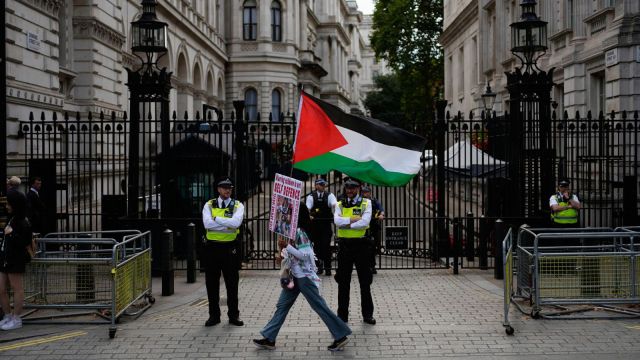
History will be changed and made at the 80th session of the United Nations General Assembly. Key Western powers and former colonisers, Britain and France, will have recognised the State of Palestine. India, with many Arab and West Asian states, recognised the state of Palestine in 1988, when Yasser Arafat declared the Palestinian National Council. Arafat also made history that year by acknowledging and accepting the two-state solution, UN Resolution 181 of 1947, which was outright rejected by the Arab states and the Palestinian leadership for years. It was Arafat’s historic political moderation that paved the path for peace with Israel in the early 1990s. Do Britain and France have any means to change the course of events in the Middle East in favour of the two-state solution? They don’t. Yet, their belated recognition of the Palestinian people and their national rights matters. It is an acknowledgement that, as colonial powers, they erred in the Middle East.
When Britain and France were the movers and shakers of world politics, they ignored Arab nationalism as well as the Palestine question at the end of World War I. The Ottoman Empire collapsed during that bloody war, and colonial masters sitting in Paris and London divided the Middle East with a secret pact called the Sykes-Picot Agreement of 1916. The Tsar of Russia, Nicholas II, was also party to this dubious deal. The three empires had kept this a secret, but after the Bolshevik Revolution in Russia, Vladimir Lenin got his hands on the state documents, and he found an opportunity to expose the British and French. The document was leaked, and the Arabs were dismayed. The Turks were delighted because they saw the Arab uprising against the Ottoman Empire as misguided and an act of betrayal. The Lenin leak certainly embarrassed the British and French. But that was not the end of the imperial interventions.
In 1917, the British Empire issued the Balfour Declaration supporting a Jewish “homeland” in Palestine, which gave credible recognition and support to the Zionist movement that arose in 1896 for a state for the Jews, who faced widespread antisemitism in Europe, particularly pogroms and ghettoisation in Tsarist Russia. The tragedy of this document was in its exclusion of the Palestinian Arabs. It categorised them as “non-Jewish communities in Palestine” and feebly stated that “nothing shall be done which may prejudice the civil and religious rights”. It took some time for the Palestinians to mobilise against this imperial whim. They picked up arms against the Jewish communities, and there was a war between them from 1936 to 1939.
It is because of this war that the first idea of partition emerged in Britain. Lord Robert Peel found the Balfour Declaration unworkable and recognised the necessity of two states for the Arabs and Jews in 1938. This didn’t work; Britain couldn’t enforce it, and then there was World War II for them to endure. Neville Chamberlain, the master of appeasing Hitler, also used appeasement as a strategy to calm the Arabs. With a White Paper, he decided in 1939 to restrict Jewish immigration immediately, hoping that it would retain Arab support against Germany and Italy. Palestine was thus closed off to Jews fleeing Nazi-dominated Europe during World War II.
The Peel Commission’s idea of partitioning the land was still the best solution found in that chaos, and it was picked up again when the UN Partition Plan of 1947 passed. The two-state solution that the world is standing behind (157 of the 193 UN member states, representing 81 per cent of the international community) provides the legal basis for recognising the State of Palestine.
Three takeaways from this tale are important. First, Britain and France’s belated recognition of Palestine signals an empire’s reckoning, a century late — a tacit admission that their imperial bargains, from Sykes-Picot to Balfour, left wounds that continue to shape the conflict. Second, the historical context above challenges the persistent myth of Israel as more of a “colonial project”. The Jewish state was fought for like Jews fought the British forces after the embargo on Jewish immigration in the White Paper of 1939, not handed down by the empires of the day; it was a Zionist struggle against the empire as much as Arab resistance to it. Third, above all, this week’s recognition is less about reshaping the Middle East than about the domestic theatre in Europe, where the Gaza war has become a flashpoint of political division, compelling leaders to act symbolically even as their influence on the ground remains limited.
The writer is Professor and Executive Director, Jindal Centre for Israel Studies, Jindal School of International Affairs, OP Jindal Global University